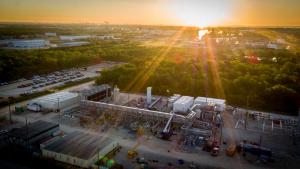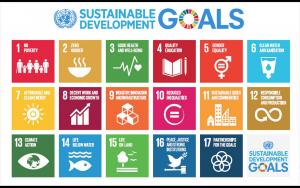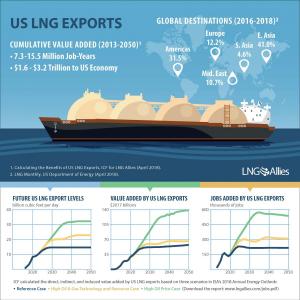July 26th, 2018
Photo Courtesy of NET Power and McDermott
NET Power is commercializing a novel power system that produces emissions-free electricity from natural gas for the same cost as conventional power plants. The system, which uses the supercritical CO2 Allam Cycle, is currently being demonstrated at a 50MWth power plant in La Porte, Texas, that is now in operation. A review of the technology will be provided, and an update will be given on the status of demonstration plant testing and operations, as well as commercial facility development.
June 28th, 2018
Energy is the golden thread that weaves throughout the 2030 Agenda for Sustainable Development and is at the core of meeting the world’s quality of life aspirations. The challenge is reconciling a tight emissions pathway with these aspirations. The 2030 Agenda represents an imperative for profound and immediate changes in how energy is produced, transformed, traded, and consumed as the energy sector accounts for 60% of total global greenhouse gas emissions.
June 8th, 2018
Program Overview
June 12th, 2018
In March, Senators Barrasso, Capito, Whitehouse, and Heitkamp introduced the "USE IT" Act in committee, which would support R&D for innovative carbon capture and use technologies.
May 17th, 2018
The Midwest Regional Carbon Sequestration Partnership (MRCSP) large-scale demonstration project recently achieved the net CO2 storage of 1,000,000 metric tons in the CO2-EOR fields in Northern Michigan. This briefing will discuss how lessons learned from this successful program can be used to move CCUS towards deployment in appropriate settings. In addition to providing key aspects of the program, the speakers will discuss how the MRCSP research is impacting new projects in the USA and globally to build technical capacity.
May 15th, 2018
Juan Belt will discuss a paper he wrote for the Copenhagen Consensus Center (CCC) that proposes measures to improve the power sector in Haiti and is based on best practices. The CCC “eminent panel”, which included a Nobel Prize winner, selected this paper as the best among 85 proposed interventions, and the International Confederation of Energy Regulators (ICER) gave it the “Distinguished Scholar Award for 2018.” Juan and Silvia Alvarado will also discuss a paper they are writing. Silvia is a former USAID
May 31st, 2018
Rare Earth Elements are essential for advanced technologies from smartphones and robots to national defense systems. The rare earth metals have remarkable chemical properties but are so evenly dispersed throughout the earth’s crust that economically attractive concentrations are extremely rare. As a result, the U.S. imports nearly all its rare earth elements from China.
May 10th, 2018
Chemical looping technologies have evolved into a promising alternative for the efficient conversion of carbonaceous fuels to electricity and/or high-value chemicals with minimal carbon emissions. These processes utilize an oxygen carrier solid material to indirectly supply oxygen to the fuel source. With the exponential growth of research and publications in this field, chemical looping has expanded to encompass power and chemical production with in-situ gas separation.
May 8th, 2018
The energy economists at ICF Inc. recently conducted a study for LNG Allies entitled: Calculating the Benefits of US LNG Exports. The report looked at direct, indirect, and induced value added ($GDP) and employment from LNG terminals and the natural gas feedstock. The principal author of the ICF report, Harry Vidas, joins Fred H.
April 26th, 2018
The Plains CO2 Reduction (PCOR) Partnership, as part of the Regional Carbon Sequestration Partnerships (RCSP) Initiative run by the U.S. Department of Energy (DOE), aims to foster the deployment of carbon capture, utilization and storage (CCUS) across a large area in the central interior of the United States and Canada. Using an adaptive management approach (AMA) to the assessment of carbon dioxide (CO2) geologic storage, the PCOR Partnership has demonstrated that secure storage can be achieved in association with CO2 enhanced oil recovery (EOR) operations.
Pages








